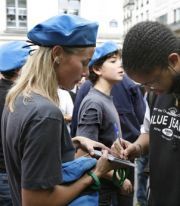Darfur conference aims for unified response in Paris
June 24, 2007 (PARIS) — Key players in the Darfur crisis are meeting in Paris on Monday in a bid to build a unified international response to violence in the troubled region, though Sudan will not be attending.
 French officials said they hope to mobilize the international community at what they called a “pivotal moment” in the four-year conflict, following the Sudanese government’s agreement earlier this month to allow the deployment of a joint African Union-United Nations peacekeeping force in the region.
French officials said they hope to mobilize the international community at what they called a “pivotal moment” in the four-year conflict, following the Sudanese government’s agreement earlier this month to allow the deployment of a joint African Union-United Nations peacekeeping force in the region.
Officials from the Sudanese government in Khartoum have criticized the day- long meeting – to which they weren’t invited – insisting it could backfire and cause more harm than good.
More than 200,000 people have died in the Darfur region of western Sudan and 2.5 million have become refugees since 2003, when local rebels took up arms against the Sudanese government, accusing it of decades of neglect. Sudan’s government is accused of unleashing in response a militia of Arab nomads known as the janjaweed – a charge it denies.
The U.N. and Western governments had pressed Sudan for months to accept a plan for a large joint force of U.N. and AU peacekeepers to replace the overwhelmed 7,000-strong AU force now in Darfur.
Sudan initially accepted the plan in November but then backtracked, before finally agreeing earlier this month.
Details about the composition, mandate and timetable of the joint force are expected to top discussions at the Paris conference, French officials said.
U.S. Secretary of State Condoleezza Rice is to represent the U.S. at the meeting, which will also include officials from the U.N., the Arab League and the European Union, as well as 11 European countries, Egypt and China.
The African Union will not be in attendance, French officials said. Chadian Foreign Minister Ahmat Allami said his country – which has seen an influx of tens of thousands of people fleeing Darfur – hadn’t been invited.
China is viewed as a power broker in Sudan because of its heavy investment in the country. The Asian giant, one of the five U.N. Security Council permanent members with veto power, has long opposed harsh measures against Sudan over Darfur.
Beijing has dramatically stepped up efforts to end the violence in Darfur in the wake of mounting criticism that threatened to taint the 2008 Olympic Games, which it is hosting.
China hasn’t received a formal request to send soldiers for the AU-U.N. peacekeeping mission, but officials have said the country is open to contributing troops.
The Sudanese government has voiced its opposition to the conference, warning it could prove counterproductive.
“Any other peace initiative, including the French one, could…contradict the U.N.-AU initiative and could derail the peace process,” Bekry Mulal, a senior official at Sudan’s Ministry of Information, said Thursday.
“I think it would have been appropriate of the French government to back the U.N.-AU initiative, instead of putting forward a new one that could impair the current efforts,” he said.
The head of Collectif Urgence Darfour (Darfur Emergency Group), an umbrella organization representing French groups lobbying for an end to the conflict, dismissed Sudanese criticism, calling the conference an opportunity for real progress.
Jacky Mamou said the absence of a Sudanese delegation could end up being a positive factor.
“Perhaps those at the conference will be able to say certain things they wouldn’t be able to say in front of the Sudanese,” he said.
Mamou said the success of the meeting would depend on whether delegates are able to define the details of the hybrid force’s deployment. It is crucial the international community agree on the deployment details to keep Khartoum from backsliding on its commitments, Mamou said.
France had long been less vocal than the U.S. the U.K. and others in pushing for peace in the region, but new French President Nicolas Sarkozy has made Darfur a foreign policy priority since taking office last month.
(AP)
